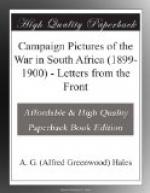Driscoll was in Burmah when the news came of the first disaster to the Irish troops in South Africa. He threw up his business as lightly as a coquette throws up a midsummer lover, and started for the war. At Bombay he was stopped by a yard or two of red tape, and had to go back to Calcutta, where he used his Irish tongue to such purpose that he got a permit to leave India, and made his way to the scene of trouble. He first joined General Gatacre as orderly officer. Later he was attached to the Border Mounted Rifles as captain, and did splendid service at the battles of Dordrecht and Labuschagne’s Nek In the latter place he was the first man to gallop into the Boer laager before the fight had ceased. Captain, then Lieutenant, Davies was as close to his side as a shadow to a serpent, and they only had fourteen men with them at the time. After this Driscoll, whose skill as a scout had been remarked on all sides, was ordered to form a body of fifty scouts to act as the very eyes of the rapidly moving Colonial Division under General Brabant. This was promptly done, most of the men picked being Colonial-born Britishers. Soon after the formation of his band, Driscoll, with fifty men, attacked Rouxville from four sides at once. Dashing in, he demanded surrender of the place, as if he had an army at his back to enforce his demands, a piece of Irish impudent valour that would have cost every man amongst the little band his life had the Boers known that he was unbacked. But they did not know it, and consequently surrendered, and he hoisted the British flag and disarmed the residents—a really brilliant piece of work, for which Driscoll’s Scouts have up to date received no public credit.
The Scout and his men took a warm part in the, very warm fight at Wepener, where many a good Briton fell. He had lost a good few fellows in the many fights, but Driscoll’s name soon charmed others to his little band. At Jammersberg Drift the Scouts were so badly mauled that over a fourth of their number were counted out, but the places of the fallen men were soon filled, and to-day the number is almost complete. Driscoll has one especially good quality. He never speaks slightingly of his enemy unless he well deserves it. Few men have had so many hand-to-hand encounters with the burghers as he has; few men have held their lives by virtue of their steady hand on a rifle as frequently as this wild, good-natured, merry Irishman has done. Yet of the Boer as a fighter he speaks most highly. “He don’t like cold steel, and shmall blame to’m,” says Driscoll, “but for the clever tactics he’s a devil of a chap, ’nd the men who run him down are mostly the men who run away from him. They’re not all heroes, any more than all women are angels. Some of ’em are fit only for a dog’s death, but most of ’em are good men; and if I wasn’t an Irishman I wouldn’t mind being a Boer, for they’ve no call to hang their heads and blush when this war is over.”




